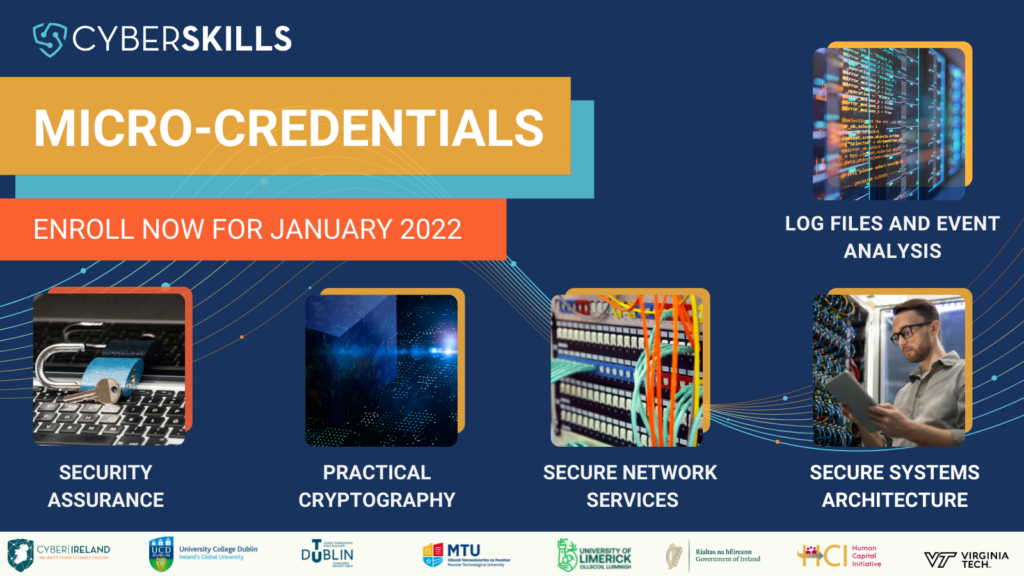Cyber Skills are Ireland’s leading experts in cybersecurity education, combining the expertise of four of Ireland’s top universities, Munster Technological University, University College Dublin, University of Limerick and Technological University Dublin working closely with Industry to provide you with Cyber Security skills needed in the workplace today.
Applications are now open for Cyber Skills Micro-Credentials and Pathways.
Micro-Credentials
A micro-credential is a short, accredited module of learning. Cyber Skills Micro-Credentials are 5-10 credits and can be used towards a major award. If you are looking to gain knowledge or skills in an area of Cyber Security, but only require specific training, then choosing micro-credentials may be the best option for you.
Cyber Skills allows you to take as many micro-credentials as you need. They are spread over 2 semesters, delivered online and fully flexible in order to fit into your schedule and lifestyle.
Cyber Skills is now enrolling for semester two micro-credentials available in January:
- Practical Cryptography
- Security Assurance
- Log Files and Event Analysis
- Secure Network Services
- Secure Systems Architecture
Find out more about which micro-credentials are best suited to you.
Secure Systems Architecture
In this module the student will learn the key concepts and techniques employed in designing secure system architectures. The module will cover key technologies to be aware of, whilst imparting the learner with the ability to keep informed on emerging technologies.
Practical Cryptography
Cryptography is an essential part of building secure and robust information systems and applications. In this module students will gain a hands-on understanding of practical cryptographic applications and their correct implementations in information systems. This will include an understanding of symmetric and asymmetric cryptography and hash functions.
Log Files and Event Analysis
Log files contain valuable information for infrastructure management as most malicious exploits and intrusions leave their fingerprints all over log files and system performance issues can be identified from analyzing specific log data. In this module, the learner will evaluate log files and learn tools to extract associated valuable data for detecting cyber threats and system performance issues. In particular, the module will provide the learner with skills to apply and use log file management tools, access log files, efficiently search log data using best practices. The learner will apply this knowledge to evaluate and implement YARA and Sigma rules for Indicators of Compromise (IoCs) and system information and event management tools. At the end of the module the learner should have developed a mindset for using log files for cyber security and incident investigation including system performance issues.
Security Assurance
IT systems inherently have security vulnerabilities both within the individual software applications or at various integration points throughout the system. In this module students will learn how to locate and identify system vulnerabilities along with methods to identify potential vulnerabilities in a system design. The student will also learn methods to validate a system’s security meets the organization’s security needs.
Secure Network Services
This module is focused on the study of advanced system and network administration topics. Topics explored and implemented will include the setup and maintenance of many of the most popular network services including servers for DNS, LDAP and email (SMTP, POP3, IMAP). Special attention is paid to the concepts needed to implement these services securely and to the troubleshooting skills that will be necessary for real-world administration of these network services. At the end of this module learners should have the ability to operate, configure and secure various electronic communication systems, services and networks.
Secure Network Systems
Network security is the activity associated with the detection and prevention of unauthorized access, misuse, modification, or denial of a computer network and network-accessible resources. In this module, the learner will evaluate common cyber security threats and defense in depth techniques to defend against these threats. In particular, the module will provide the learner with the skills to apply and use various computer protection components such as Firewalls, VPN and Intrusion Detection and Response Systems (NIDRS) and security techniques such as zoning and encryption. At the end of this module the learner should have the ability to operate and interpret information collected from various network security equipment and network tools to implement a secure network architecture.
Information Security Architecture
Module around information security and its importance in protecting the confidentiality, integrity and availability of systems and information. The student will develop the skills to discern between the different security needs of various stakeholders, evaluate the robustness of security designs and design security controls to protect information assets.
Cryptography & Protocols
Cryptography is integral to our online world and information systems. It is essential that when building these systems we understand the significance of the cryptographic applications we use. In this module the student will learn the fundamentals of cryptography and its application in security protocols. These protocols allow systems to achieve information security, privacy and trust. Students will learn the mathematics and cryptographic tools to analyse and understand the strengths and shortcomings of such security protocols and will develop an understanding of how to improve insecure systems.
Secure Software Development
A module focusing on secure software development practices and how they should be integrated throughout the software development life cycle. The module explores various pitfalls and mitigation techniques for software-based attacks and how to prevent the inclusion of such vulnerabilities in software.
Cybersecurity Standards & Risk
In this module students will learn about risk management processes with a particular focus on how to manage the risk related to the use, processing, storage, and transmission of data. Laws, regulations, controls, compliance and violations as it pertains to personal information and data are also included as part of this module.
Cyber Skills have also developed Pathways, QQI accredited qualifications which have been developed in close alignment with the NIST NICE CyberSecurity Workforce framework, to provide you with the cyber security knowledge, skills and training needed to upskill and enhance your career in ICT.
Applications are now open for Cyber Skills Pathways for January 2022. Learn more here
Learn more about Cyber Skills and courses available here












Comments